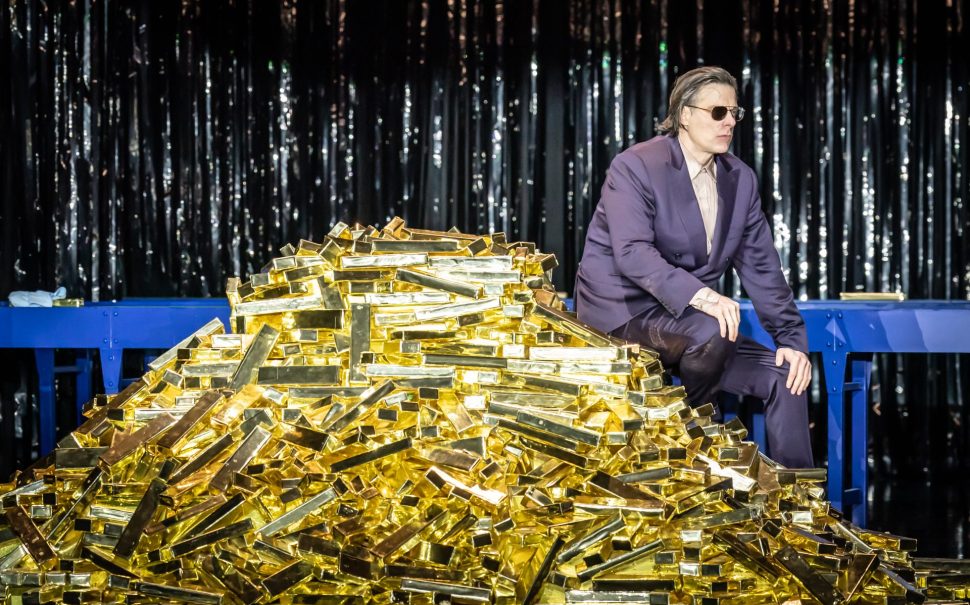Opera director Richard Jones must currently be wondering if the curse that drives the plot of Wagner’s The Rhinegold hasn’t also blighted his own involvement with the work.
This new production at the beleaguered English National Opera represents Jones’s third shot at The Ring cycle, the epic work of which The Rhinegold is the first instalment.
His first attempt, back in the 1980s, was cancelled halfway through due to lack of funding. The second, for the Royal Opera at Covent Garden, was greeted with torrents of booing and a critical mauling.
And now his latest attempt to scale opera’s Mt. Everest has also been cut down in its prime. Funding cuts from the Arts Council and the withdrawal of co-producer The Metropolitan opera in New York mean the full cycle will no longer go ahead as planned.
Human emotion
It’s a sad loss. Jones excels in human-scale, psychologically motivated storytelling that teases out nuances of character. This is a story of lust, rage and dread and these emotions are carefully plotted by director and cast.
John Relyea’s Wotan is already showing incipient signs of the foreboding that will come to cripple him in the later stages of the cycle.
Leigh Melrose’s Alberich, if a little over-egged at times, makes a chilling progression from socially maladroit teen to tattooed adult sociopath bent on world domination. By contrast, Frederick Ballentine’s impish Loge is cheerfully amoral as he helps his boss evade his contractual obligations.
No less attention has been lavished on the supporting roles. Particularly well done is the relationship between Simon Bailey’s Fasolt and Katie Lowe’s Freia. Their sense of loss at being parted from each other, with the godess draping a handkerchief over her murdered captor’s face, is genuinely touching.
Visual effects
Thanks to Stewart Laing’s designs, the new production also achieves some terrific visual effects. The depths of the Rhine shimmer seductively and the rainbow bridge glitters in glorious technicolour. We even get an HGV backing onto the stage to take away the giants’ treasure.
The Rhinegold itself is personified, in puppet form, as a naked new born baby, symbolising the purity and innocence that the theft of the gold destroys.
The hellish Niebelheim, where Alberich’s minions toil to enrich their master, suggests both sweatshop garment factory and neon-lit megacorp warehouse.
The ambivalence of Wagner’s ending, where the gods’ triumphal procession to Valhalla is shot through with bombastic irony in the orchestra, is brilliantly captured on stage, their newly built palace transforming before their eyes into a concrete-lined panic room.
Politics and power
But surface sheen aside, what is missing (both here and in last year’s The Valkyrie, which makes up the second part of the cycle) is any serious engagement with the socio-political subtext of The Ring.
We have had depoliticised Rings before. And no single production of this multi-layered and richly allegorical work can do full justice to its range of meanings. But in a work that has so much to tell us today about power, economics and ecology, this reluctance to engage with any wider context left me feeling shortchanged. Some suggestion of the society in which this story is playing out would have been welcome.
Ebb and flow
Musically the production is on convincing, if not necessarily thrilling, ground. Relyea’s bass-baritone makes up in clarity and expressiveness what it lacks in heft and authority. Ballentine’s light, bright tenor captures Loge’s airy insouciance, and Melrose’s rich and full baritone brings power and menace to Wotan’s nemesis.
In the lesser roles, John Findon’s Mime stands out for his plaintive, clarion tenor and mezzo-soprano Christine Rice makes the most of Erda’s portentous warning.
Julian Hubbard and Blake Denson do full justice to Froh’s and Donner’s lovely mini-arias towards the end of the opera.
In the pit, Martyn Brabbins seemed to not quite have the full measure of this complex score’s ebb and flow. The musical peaks, which in the best hands can seem like violent irruptions, lacked bite, while the complex passages of exposition lacked clarity and detail.
This is an emotionally involving, visually thrilling and superbly executed production with good, if not great, singing. It’s a shame we won’t be seeing the full cycle. But Jones’s lack of engagement with the work’s wider themes ultimately deprives us of the Ring’s full meaning.
Featured image credit: Marc Brenner



Join the discussion
“Richard Jones must currently be wondering if the curse that drives the plot of Wagner’s The Rhinegold hasn’t also blighted his own involvement with the work”
Richard Jones *is* the curse dogging Wagner’s Ring cycle, at least for anyone living in London who hopes to see a decent production of it. Whatever the Met’s stated reasons for pulling out of this co-production, they’ve dodged a bullet.